Though the nation of Israel has previously existed off and on under different forms of government—judges, prophets, kings and many foreign rulers—1948 marked the first time Israel would exist as a democracy. While Jews had centuries of records and experience in being an independent people, they would now, for the first time, wrestle with their identity as a Jewish nation governed by the Law of God as well as a modern nation governed by “we the people.”
The year was 1996. In the fall, a U.S. based Christian ministry mailed a million books titled “The Peace” to most of the households in Israel. The book presented the claims and promises of Yeshua as Messiah of Israel.
It’s not how we would’ve done it. Israelis are very relational, and it takes time to build trust and heal wounds from thousands of years of persecution and misuse of the name of Yeshua. So, anonymously sending a book to explain why Yeshua is actually their Messiah and implying their ancestors should’ve converted to Christianity rather than be murdered by Crusaders—is something you do when you don’t understand Israel.
Not unexpectedly, the ultra-Orthodox (Haredi1) community was outraged and demonstrated against the books by burning them in bonfires and blowing the shofar in front of the Prime Minister’s home. Threats of vengeance poured out against the local Messianic community (as we are considered the main perpetrators of “mixing” Yeshua with Judaism) and both television and newspapers extensively covered the uproar. Just before the New Year of 1997, an article appeared in Israel’s largest newspaper with the headline, “The Inquisition is Already Here!” 2
At first we thought the article was warning that Christians were coming to forcibly convert Jews in Israel, but this Israeli journalist was actually warning Israel’s Messianic Jews of what was coming for us!
The article reported that the government had issued a proposal for new legislation outlawing the printing and distribution of all “missionary” materials.
The Orthodox definition of “missionary materials” was anything that propagates the name of Messiah Yeshua. The article went on to say, “the new legislation proposal of [Knesset Members] Nissim Zvilli and Moshe Gafni states that anyone who has in their possession or prints, copies, distributes or imports publications that contain any coercion to change one’s religion, can be sentenced to one year in prison.” Again, “coercion” in their dictionary could mean to promise any benefit, such as forgiveness of sin through the atonement of the Messiah.
Incredibly, Zvilli and Gafni had quickly rammed its preliminary reading through the Knesset committee by a vote of 21 to 7. Considered a “private law” it would need to pass four additional readings, but the fact that it even passed their committee left our small number of Israeli Messianic Jews aghast. This law would make all active Israeli believers into criminals.
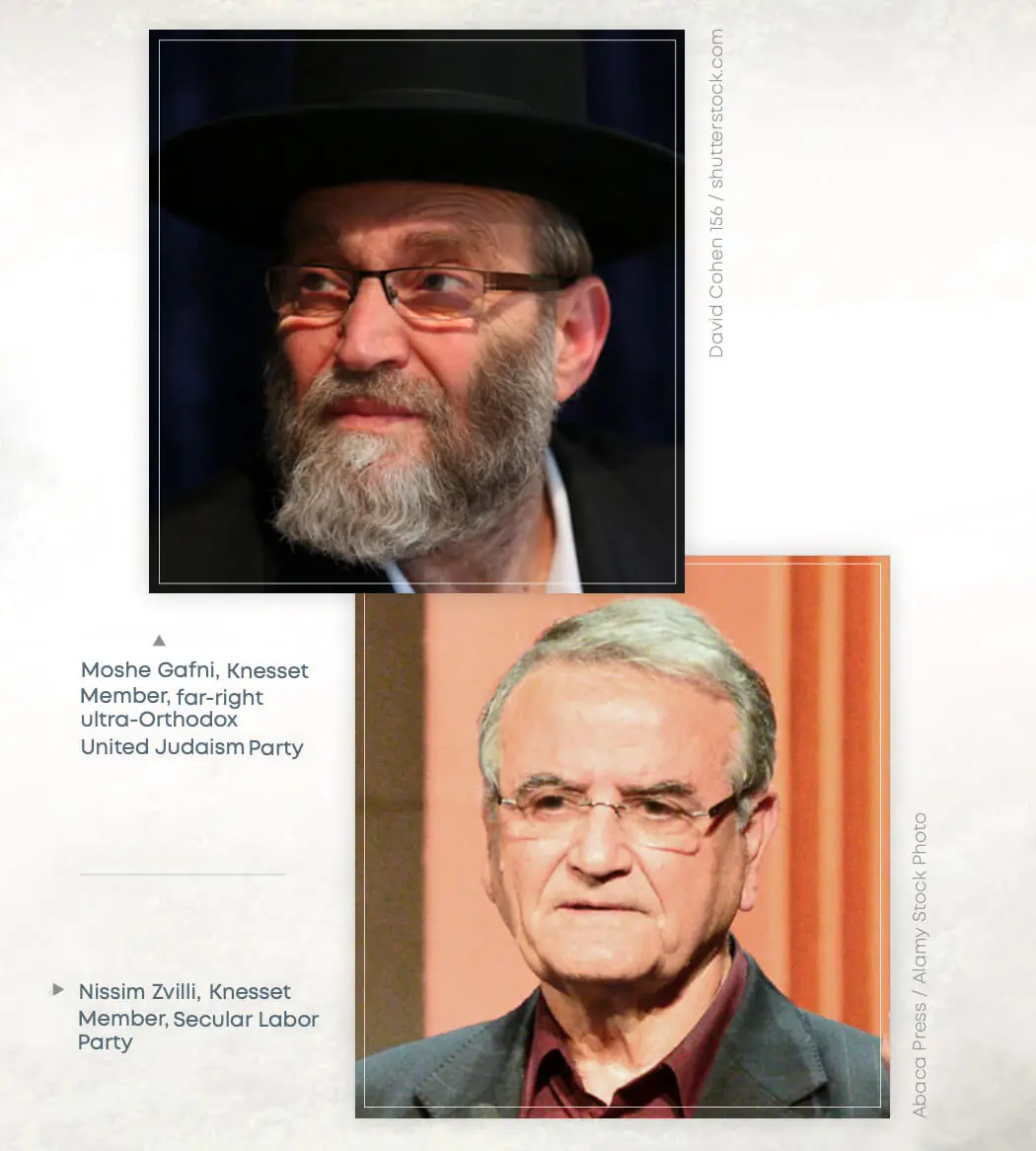
One Year In Prison for Possessing a New Testament?
Pundits began commenting that this bill could actually become a law in a single day if steered cleverly through the Knesset. Understanding the full ramification of such a law, the journalist, Menachem Ben, bravely made a rather impassioned case that this law would not only criminalize Messianic Jews, it would also be enforced against secular Israeli writers who write in a respectful way towards Yeshua. He reminded his readers that “the New Testament is considered to be a classic book in one of the world’s cultures,” yet in Israel “its reading will be prohibited by law.”
Ben was unusually blunt: “[The Orthodox] are clearly a growing threat to the concept of democracy and the freedom of conscience—the freedom to choose what you believe—unless you choose Orthodoxy.” He added, “Only in Saudi Arabia and Iran do we find such prohibitions
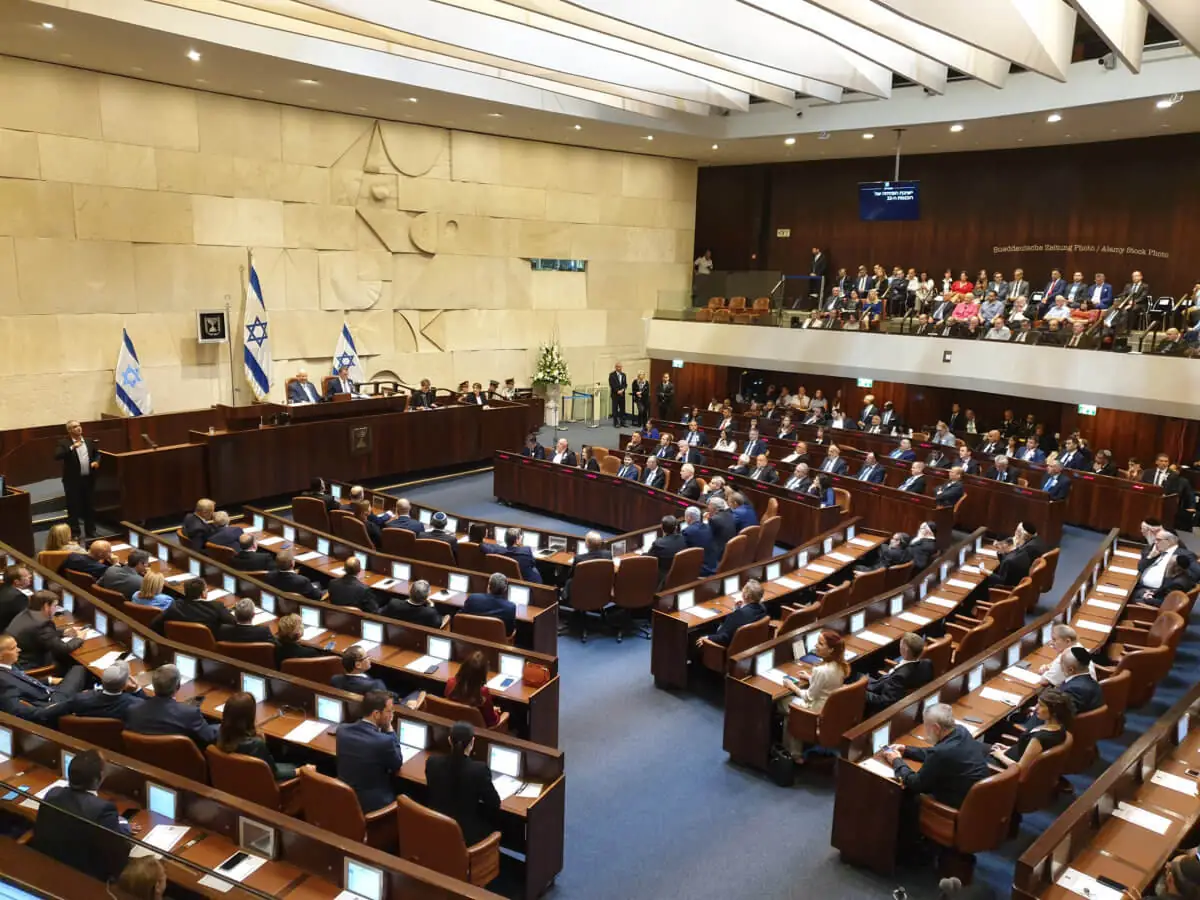
Israeli Knesset (Parliament)
Messianic Jews Unite!
When we first heard about this bill, we assumed such a law was so utterly preposterous that it was only an aberration, a blip on the screen of Israel’s political idiocies. After all, Israel prided herself on being a democratic, western-oriented state.
Still, the bill soon caused deep foreboding among both Jewish and Arab believers in Yeshua. Its terms were vague and wide-ranging. It did not specify what kind of material was referred to or what kind of “possession” would be illegal. “Distribution” of offending material could include personal letters and gifts. Even word-of-mouth sharing of views could be affected. Police would have the right to search homes, confiscate literature and harass suspected believers. Offenders would face prison time.
In March 1997, the full Knesset passed the first and second reading.
The Messianic Jewish community sprang into action. For the first time ever, virtually the entire Messianic Body of Israel came together to seek God’s direction on how to combat this bill. During the debate of the bill—which could be seen on television—some Orthodox lawmakers suggested they intended to enact stronger laws in the future which would outlaw all Messianic organizations and activity in Israel. Such a bill, if made law, could lay the grounds for state-organized persecution of all followers of Yeshua.
A Jewish pastor in the Tel Aviv area, Baruch Maoz, (no relation to our Maoz organization) called for an urgent meeting of Messianic leaders to discuss what we should do. We would fight in prayer as well as action. And so, the Messianic Action Committee (MAC) was formed. A seven-member committee, each with their own unique contacts and connections, offered a diverse demographic in the Body. Though very different in their theological backgrounds, they began to work seamlessly together, meeting with politicians, lawyers and journalists.
Baruch, from a very conservative background, was initially chosen to be Chairman, but soon felt led to hand the position to Paul Liberman, our long-time friend and Maoz board member who had extensive experience lobbying in U.S. politics. Pastor Danny Yahav of the Tiberius area, lawyer Marvin Kremer from Haifa, and teacher Noam Hendren from Tel Aviv became active members. Also included were Charles Kopp, Chairman of the United Christian Council of Israel (UCCI) representing the Christian community in Israel and Nizar Tuma, a Christian Arab, who did a great job of bringing together the Arab Christian community to stand with the Messianic Jews. It was a small but mighty unified force.
Paul’s strategic experience and ingenuity went into high gear. He explained to the team that “if we fight the Rabbinical establishment from within the country, we will lose. A better strategy would be to counterattack from outside the country. There we have the high ground.” So Paul and Charles Kopp traveled throughout Europe pleading our cause before government officials and church leaders alike. Incredibly, everyone with whom they spoke agreed to participate in the fight!
Fighting with Faxes
Maoz, along with other Messianic organizations—in Israel and abroad—shared within our circles of influence that such a law was not only dangerous and immoral, it was a breach of the U.N. Declaration of Human Rights Israel had signed, which includes the right to “freedom of thought, conscience, and religion …” and the freedom to access uncensored information via any and all media. We appealed month after month to our readers and friends to send faxes (in those days it was all about faxes!) to the Prime Minister’s Office and other high government officials.
Multiplied thousands of letters, faxes and emails were sent to the Israeli government officials from Christians and Messianic Jews around the world. Many of our Maoz readers participated. Furthermore, lawmakers from many nations sent “letters of inquiry” on official letterheads concerning the proposed law.
The MJAA (Messianic Jewish Alliance of America) joined the fight leading a drive constantly sending faxes for two to three hours a day for six months to the Prime Minister’s office, clogging their fax machines, and preventing the government’s ability to handle their normal business by fax!
Paul recalls: “Charles Kopp, Nizar Tuma, and I went to the Prime Minister’s Office to speak to the Director of Communications. He greeted us with, ‘I have a whole roomful—not a desk full, a roomful—of faxes and letters pertaining to your legislation’. So I answered, ‘Think about it; here we are, an Arab, a Jew and a Christian; we are all friends and we are all getting along.’ He retorted, ‘Don’t you evangelize me!’”
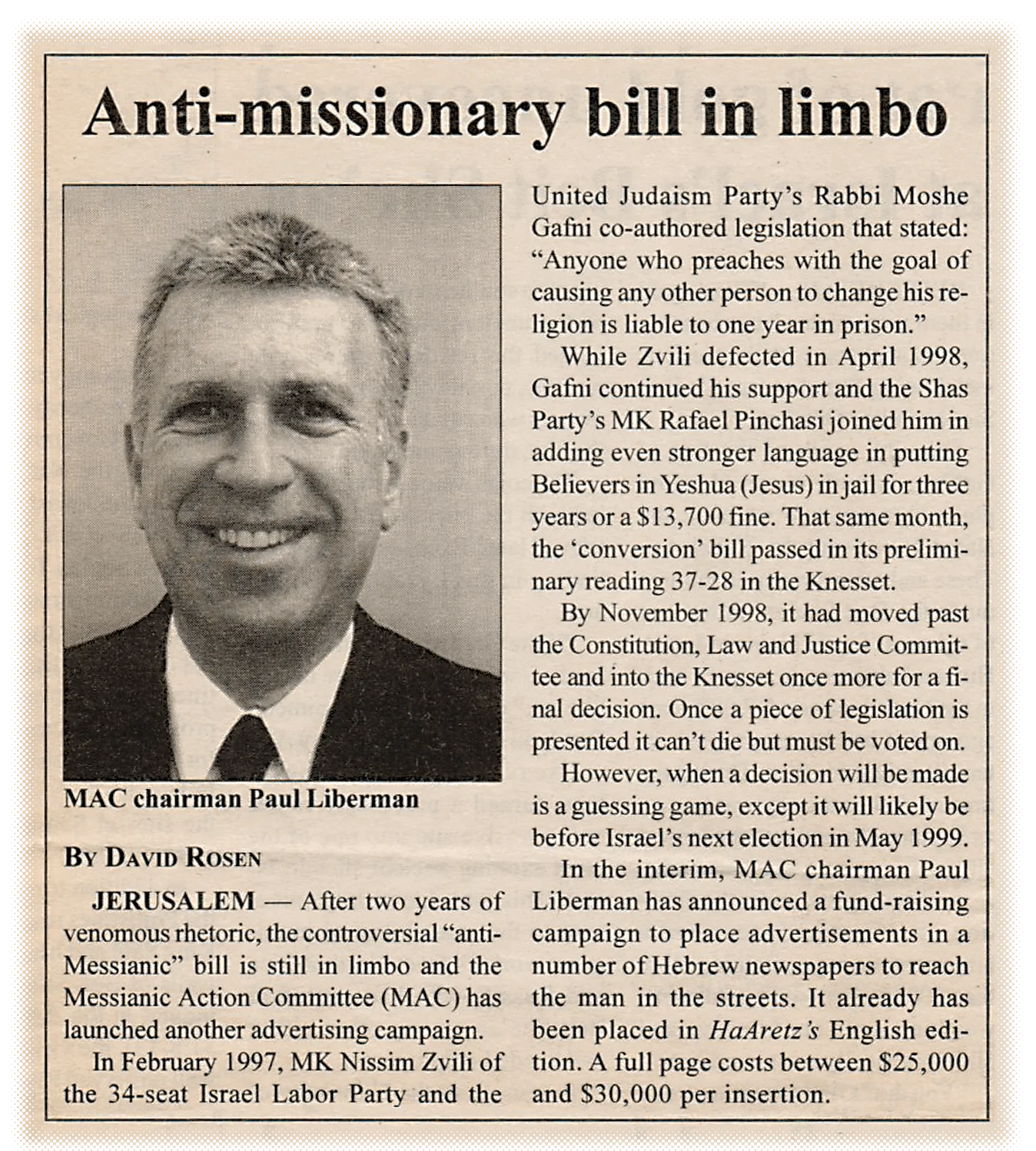
Jerusalem Post, 1998
Newspapers Began to Defend Us
As the letters rolled in by the hundreds and then the thousands into the offices of the prime minister and Knesset members, and reports of Orthodox violence against believers began to trickle in, the newspapers really began to take note. Some journalists, notoriously not sympathetic to our faith, began to defend our cause:
“The Ultra-Orthodox have opened an all-out, frontline war against this movement … Ultra-Orthodox organizations attack believers, physically harming them, their families and the structures where they gather … [believing that] the Messianic Jews are a real threat because they draw the Israelis, especially the Israeli youth … [The Orthodox fear] the constant influx of new believers who are joining the Messianic movement. Therefore, a decision was made to bring this situation to an end.” 3
Christians and Zvilli Negotiate
It’s possible Zvilli and Gafni initially felt they could ride out this international wave of protest and then proceed with passing the law. However, the protests continued to become the longest and strongest staged protest in the history of the modern state of Israel! Zvilli, the liberal member, feeling the sustained heat, began looking for a face-saving device to back out of his co-sponsorship.
On the other hand, negotiating with extreme right-wing Gafni was a non-starter as he felt his mission was from the Almighty Himself. However, in those earlier years of the State of Israel, it is important to understand that one of the principal reasons such a proposal could have even been conceived by a liberal Knesset member is that virtually all Israelis, rich and poor, professors and uneducated, diplomats, politicians and plumbers believed three things: 1. Christian organizations try to buy Jewish souls with money and material goods. 2. Churches take advantage of the socially underprivileged and entice minors. 3. Christians want Jews to convert to Christianity, that is, to deny their Jewishness, their people and their traditions, their God—and as such destroy the Jewish race.
Sensing the opportunity to both combat the bill and denounce this widely accepted misconception of Christians and their activities, a group of Evangelical Christian organizations in Israel, headed by Clarence Wagner of Bridges for Peace and Petra Heldt of the Ecumenical Fraternity, spent months working on a statement that would provide Knesset Member Zvilli with the means to gracefully drop support for the bill. In addition, Christians hoped Israelis would come to realize that Evangelicals today are not anti-Semitic but actual lovers of Israel.
After much consultation with many mainline Christian groups in Israel and with Zvilli, as well as input from MAC, the statement was completed and a press conference was set up. Then to the shock of the Christian and Messianic communities in Israel, the day before the scheduled press conference where this statement would be presented, Knesset Member Zvilli called a press meeting and announced that Christians in Israel had promised not to engage in proselytism, and therefore he was withdrawing sponsorship of his anti-missionary bill and would also endeavor to convince his Labor party to vote against it.
Although the Messianic community was greatly relieved to hear that Zvilli was withdrawing his sponsorship, there was no little dismay concerning the headlines which began racing around the globe hailing the end of evangelism in Israel. One believer from Russia even called a leader in Israel asking if the report they heard on a Moscow radio station that Messianic believers in Israel agreed to stop all evangelizing was true.
Christians Push Back
To counteract what today we would call fake news, the next day Clarence Wagner shared the prepared statement as planned. He followed up by explaining that the statement he read on behalf of Christians at the press conference “which affirms our right and duty to commend our faith had been seen by both Zvilli and Gafni, so they were under no illusion thinking we would cease to proclaim our faith, which is a basic democratic and religious right for which we were fighting. That is why we wanted the law rejected in the first place.”
However, when the international papers continued interpreting Zvilli’s preemptive statement that all believers would cease to share their faith with interested parties, MAC felt the need to make our own statement specifically on behalf of Jewish believers. In it we commended Knesset Member Nissim Zvilli for his courageous step in withdrawing his support of the Bill for Religious Censorship and added emphatically that in no way would we cease from exercising our “right and duty to proclaim Yeshua.”
Messianic Ads Reach 1,000,000 Readers
One of the greatest accomplishments God granted the MAC was in forging relationships with the media. Never since Israel’s birth had we ever had access to Israel’s newspapers and media. But because of this attempt to outlaw Messianic Jews, it became a political issue, and therefore the press felt it should give opportunity to the Messianic believers to respond. Ironically, the proposed laws, instead of silencing the Messianic Jews, gave us a massive window (although, admittedly an expensive one) to let the nation of Israel know that Yeshua is our promised Messiah.
Organizations in the United States like the 700 Club, Jews for Jesus, MJAA—as well as Maoz partners—collectively raised almost a million dollars for the Messianic Body in Israel. With these funds MAC blitzed the newspapers with ads for over a year! We advertised in three languages—Hebrew, Russian and English—in seven newspapers!
On April 29, 1998, the eve of Israel’s 50th Year Jubilee, all these newspapers published special editions for Israel’s Independence Day. Our full-page ad featuring Isaiah 53 appeared in all these newspapers. They reached well over 1,000,000 households! The ultra-Orthodox were horrified with the new freedom we were given to carry our message to the public; these ads were certainly wearing down the religious authorities.
As protests continued, Prime Minister Netanyahu wrote to an evangelical friend of Israel, assuring him that he would “strenuously oppose” the bill. The MAC made that commitment public so that the Prime Minister could not backtrack, whereupon the ministry for Foreign Affairs began to quote that letter in response to protests which continued to arrive!
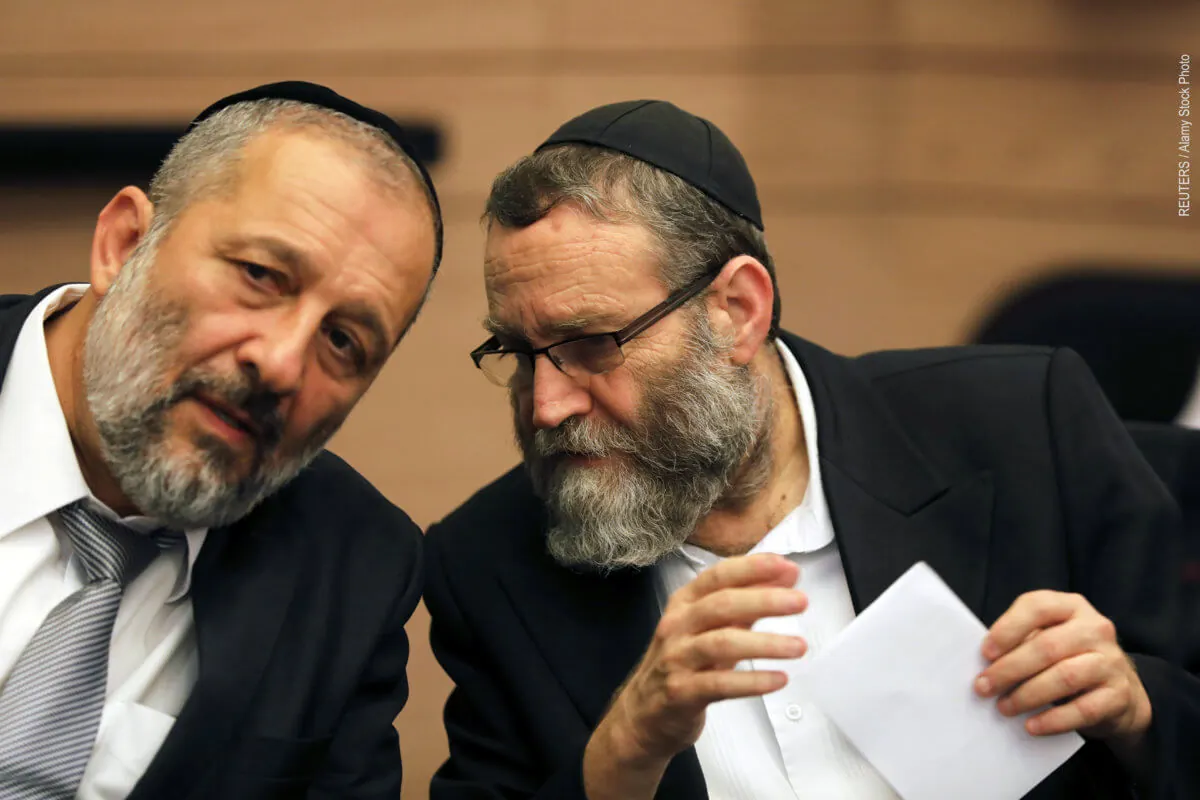
MK Moshe Gafni speaks with MK Ariye Deri from the ultra-Orthodox Shas party
Another Bill Worse than the First
By late 1998, Knesset Member Gafni from the Ashkenazi ultra-Orthodox was not at all ready to give up on the first bill. The Sephardic Shas party, also ultra-Orthodox, by now was increasingly dissatisfied that no bill whatsoever against believers had yet passed into law. So three weeks later, Shas Knesset member Raphael Pinchasi introduced a brand new “anti-missionary” bill. And to our shock, the entire cabinet—including Prime Minister Netanyahu—voted for the bill in its first reading!
This proposed law was to be the mother of all laws against fundamental civil rights. The new law would forbid preaching “with intent to change one’s religion,” punishable by three years in jail or $13,000 fine and would make illegal “changing one’s religion.” The bill made assurances that only those who preach “under the shadow of the cross” would be affected by the law. Meaning Jews could become Hindus, Buddhists or Satanists—just not believers in Yeshua.
The Final Round
Then another right-wing lawmaker sought Knesset approval to introduce yet another bill. When he demanded the Knesset vote to outlaw the Messianic Jewish movement altogether, the Knesset Committee Chairman said, “No. The Bosses in America say ‘no!’”
Incredibly, the attack against believers in Israel actually served to put Messianic Jews on the map in Israel and worldwide. After this battle, most people in the western world now knew we existed! But even more significantly, in this pivotal moment of Israel’s modern history, a few thousand Messianic Jews, with much help from Christian servants of God, literally prevented Israel from becoming a theocracy—a religious dictatorship!
In June 1999, Prime Minister Netanyahu was suddenly ousted by Ehud Barak. All the proposed laws disappeared, never again to be seen. Though Netanyahu would return to power years later and continue giving the Haredi community extensive power and control in Israel, never again has there been an attempt to legislate against the freedom of the Messianic Jewish community in Israel.
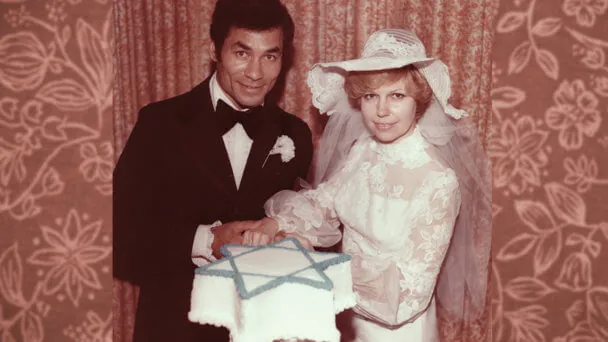
How it all began
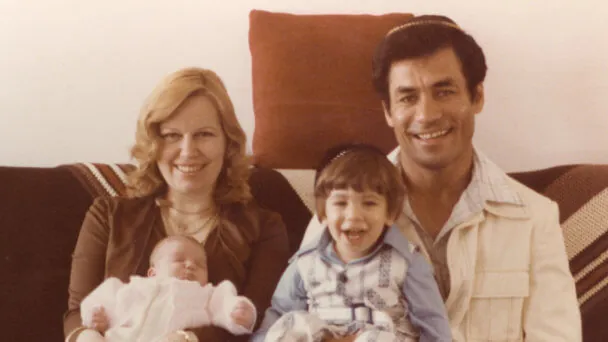
When Ari Met Shira
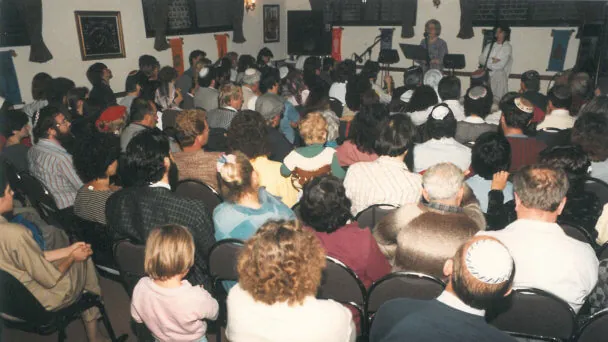
The First Congregation

The War, the Immigrants and the Training Center
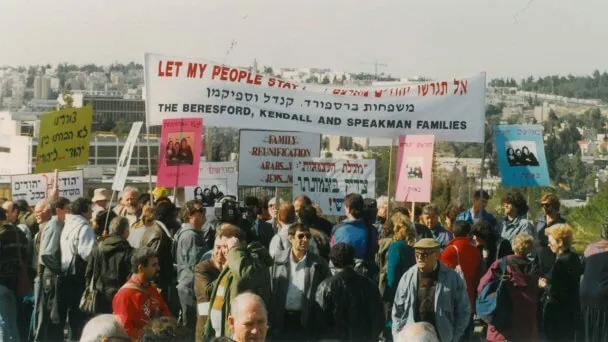
Israel’s Second Underground Railroad
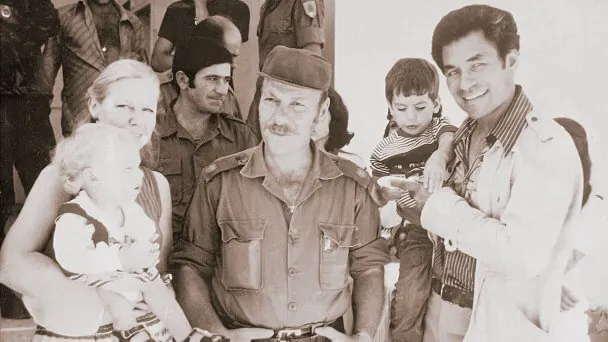
The Major and the Millionaire

Diary of an Israeli Soldier

The Right to Exist
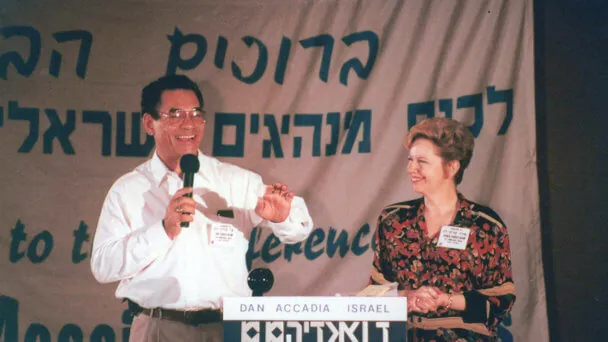
Never Say Never

The Birth of Tiferet Yeshua
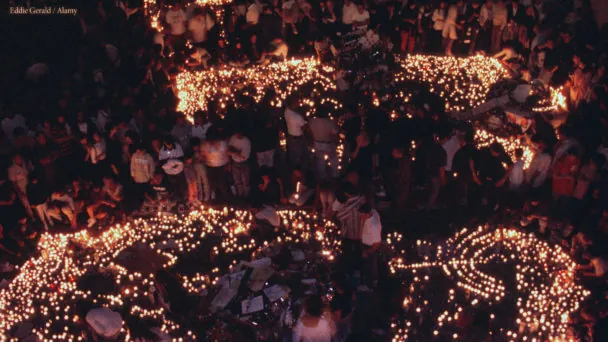
A Spark in the Dark
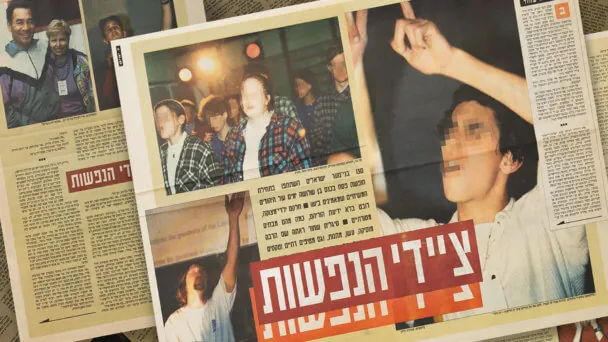
The News & The Police
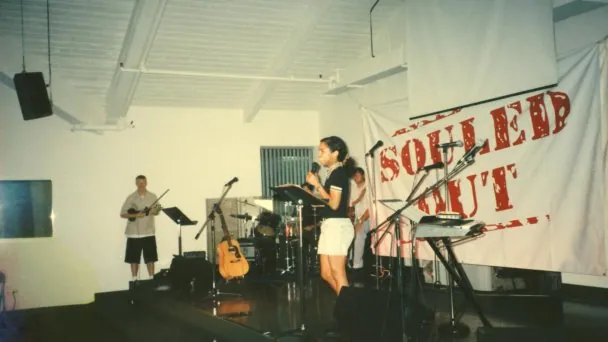
Souled Out Comes to Israel

Israel Wrestles with Democracy


